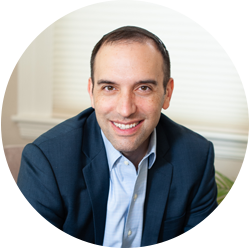Dear Friends,
Last Sunday, I had the pleasure of celebrating a double rededication at the Hebrew College and Temple Reyim shared-campus groundbreaking and Hanukkah celebration. The event marked their new partnership and their vision of a campus for Jewish life, learning, and creativity that will also serve as home to six other local and national Jewish organizations.
The menorah lighting following the program was a powerful symbol of leadership and institutional collaboration as representatives from the nine organizations —Hebrew College, Temple Reyim, Jewish Arts Collaborative, Jewish Women’s Archive, Kesher Newton, Keshet, Massachusetts Board of Rabbis, Mayyim Hayyim, and Zamir Chorale — took turns lighting the candles.

Top row: Rabbi Dan Berman, Temple Reyim; Dr. Joshua Jacobson, Zamir Chorale of Boston; Mara Bloom, Temple Reyim; Ilana Snapstailer, Kesher Newton; Carrie Bornstein, Mayyim Hayyim; Dr. Judith Rosenbaum, Jewish Women's Archive. Front row: Rabbi Sara Paasche-Orlow, Hebrew SeniorLife; Rabbi Sharon Cohen Anisfeld, Hebrew College; Idit Klein, Keshet; Laura Mandel, Jewish Arts Collaborative
People often ask me what we’ve learned and how our community has changed during the pandemic. It is hard to miss the extraordinary resiliency and adaptability that have sustained and strengthened Jewish life. But what might be less visible is a new spirit of collaboration that was already taking root and has accelerated during the crisis.
During the 360Five listening tour in my first year at CJP, I recall a community leader sharing: “We have a lot of great programs (and organizations), but I worry... we are all competing for the same participants. I would like to see us partner more... rather than work in our silos.”
It seems so simple: partner more.
And yet, for many reasons, it is so much harder to collaborate and rarer than it might seem.
But things are changing. We are witnessing cultural shifts in the character of our community and the nature of organizational leadership that are reforming the foundations on which we are building and creating our future, together.
I see leaders willing to be humble and vulnerable, recognizing that no one institution has all the answers or can provide for all the needs of its own members or participants. I see a growing abundance mentality that views success as a win-win proposition. I see organizations putting the human beings they serve at the center of their work.
Finding new ways to learn, work, and lead together is the only way to tackle the most pressing challenges we will continue to face. It is both strategic and pragmatic. But it is much more than that.
It is about a spirit of areyvut, collective responsibility for one another, the greater whole of the Jewish community, and the interconnected world of which we all are part and that, in turn, affects us all. It is about deeper, more authentic relationships between leaders, organizations, and all of us — relationships based not only on shared interests (although dayeinu, that might be enough!), but also on empathy, curiosity, and love (even when we don’t like, or agree with, one another).
Our world needs healing and our social fabric needs reweaving in so many ways. I believe that our community can help light the way.
Rabbi Sharon Cohen Anisfeld, President of Hebrew College, captured this beautifully by quoting an ancient midrash (rabbinic commentary) that described our ancestor Abraham as one who “stitched together all who inhabit the earth” and, in her words, “saw connection and created connection everywhere.” She said of herself, “In the face of forces that conspire to tear us apart, I want to be with people who show up to help stitch together the fabric of our communities, the fabric of our lives.”
Amen.
Shabbat Shalom,
Rabbi Marc Baker

About the Author
CJP President and CEO Rabbi Marc Baker is an educator, writer, and leadership mentor who is devoting his life to Jewish learning and building Jewish communities.
